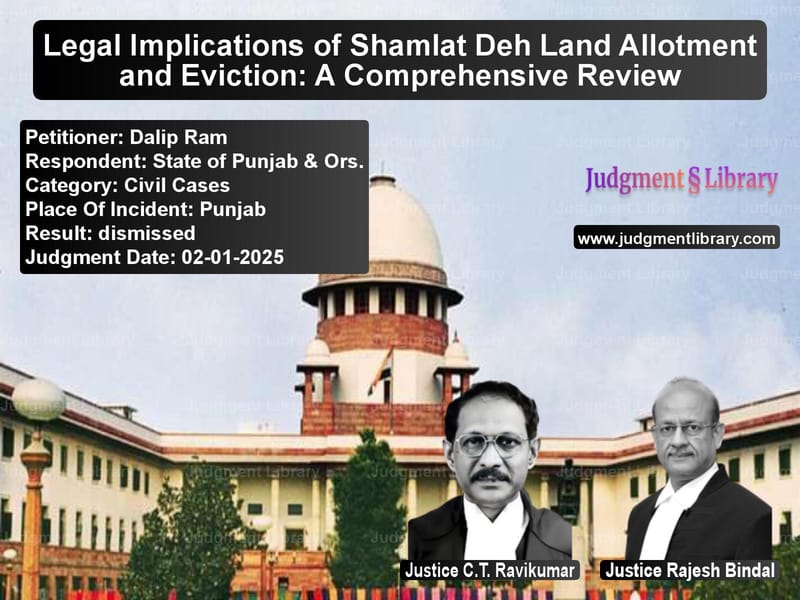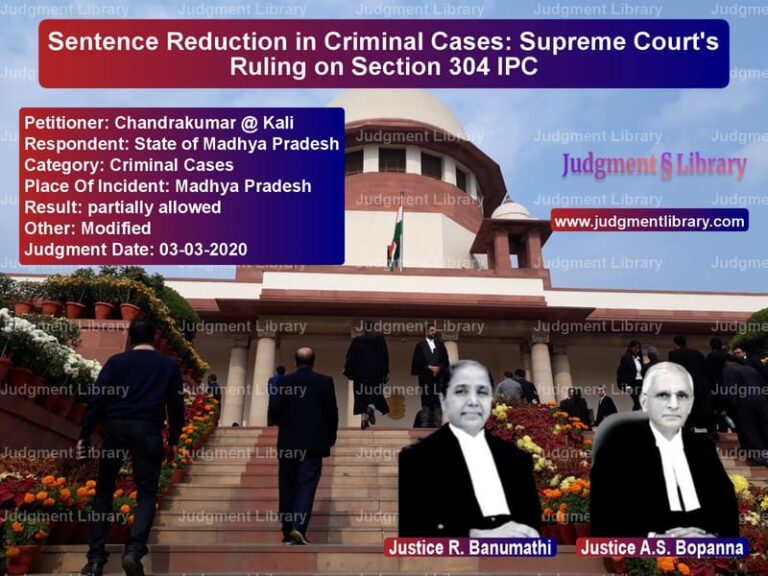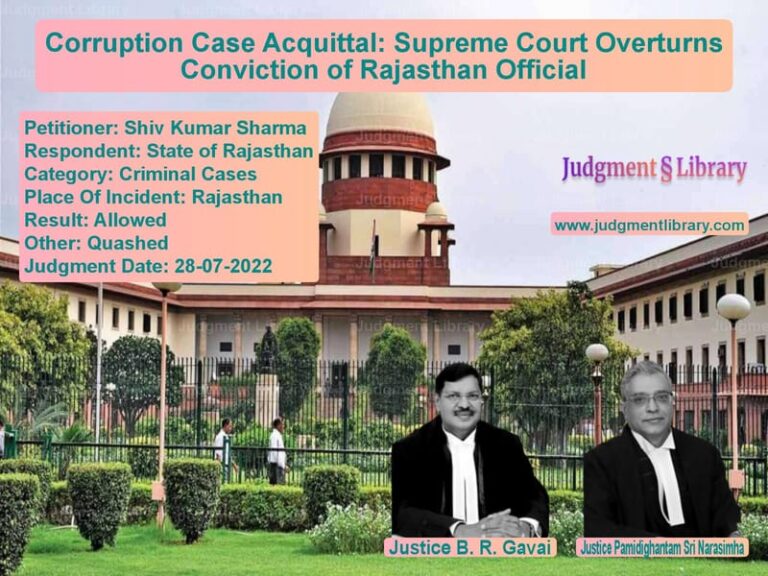Legal Implications of Shamlat Deh Land Allotment and Eviction: A Comprehensive Review
The Supreme Court of India recently delivered a significant ruling in the case of Dalip Ram v. The State of Punjab & Ors., which involved a dispute over the possession and ownership of land categorized as Shamlat Deh. The case was pivotal in determining the legal rights concerning lands that were either allotted to displaced persons on a quasi-permanent basis or transferred in some other manner, and whether such lands could be evicted under the provisions of the Punjab Village Common Lands (Regulation) Act, 1961.
Dalip Ram, the appellant, sought to challenge the eviction order passed by the Gram Panchayat, claiming that the land in question was allotted to his father on a quasi-permanent basis. The main issue revolved around whether the amendment to Section 2(g)(ii-a) of the Act would apply to his case, providing statutory protection for the allotment of Shamlat Deh land. The case also delved into the definition of ‘displaced person’ and the concept of ‘quasi-permanent allotment’ in the context of land rights.
Background of the Case
The dispute began when Dalip Ram, a son of a displaced person, was found to be in unauthorized possession of land that had been allotted to his father under the Punjab Government’s rehabilitation schemes. The land, initially categorized as Banjar Qadim (fallow land), was later identified as Shamlat Deh land, and Dalip Ram continued to occupy the land even after his father’s lease expired in 1971. The Gram Panchayat filed for his eviction, arguing that the land vested with the Panchayat and Dalip Ram was an unauthorized occupant.
The appellant claimed that his father had been allotted the land by the government in 1961, and that he had continued the possession as a lessee. Furthermore, Dalip Ram contended that the amendment to Section 2(g) of the Punjab Village Common Lands (Regulation) Act, 1961, which provided protection for certain land allotments, applied to his case. However, the Gram Panchayat asserted that the land was Shamlat Deh, and the lease had expired long ago, making Dalip Ram an unauthorized occupant.
Key Legal Issues
- Whether Dalip Ram’s father’s land was allotted on a quasi-permanent basis and whether the amendment to Section 2(g)(ii-a) of the Act applied to such an allotment.
- The definition and scope of the term ‘Shamlat Deh’ and whether the appellant’s possession could be considered authorized or unauthorized.
- The applicability of the term ‘displaced person’ and how it relates to the legal rights and protections under the Act.
- The impact of non-payment of rent (Chakota) and the expiry of the lease period on the appellant’s right to remain in possession of the land.
Arguments of the Parties
Petitioner’s Arguments
The appellant, Dalip Ram, represented by his counsel, argued as follows:
- The land in question was allotted to his father as part of a government rehabilitation program for displaced persons, and it was transferred to his father on a quasi-permanent basis.
- Under the amended Section 2(g)(ii-a) of the Act, such allotments, if transferred on a quasi-permanent basis to displaced persons, were exempt from being classified as Shamlat Deh. The petitioner argued that his father was entitled to continue the possession of the land after the allotment.
- The appellant claimed that the eviction order was unlawful because he had continued to occupy the land as a lessee, even after the expiry of the lease period, and had made substantial improvements to the land.
- Dalip Ram further contended that the Gram Panchayat’s claim to ownership of the land was based on incorrect legal interpretations and lacked proper documentation.
Respondent’s Arguments
The respondents, represented by the Gram Panchayat, presented the following arguments:
- The land in question was recorded as Shamlat Deh, and the appellant’s father was a lessee of the land under a temporary lease for a fixed term. The lease expired in 1971, and the appellant continued to occupy the land without paying rent or handing it back to the Panchayat.
- The Gram Panchayat asserted that the amendment to Section 2(g) did not apply to this case, as the land was not allotted on a quasi-permanent basis, and no legal transfer of ownership had occurred.
- According to the Gram Panchayat, the appellant’s possession of the land after the lease expired was unauthorized, and the eviction order was in line with the provisions of the Act for unauthorized occupation.
- The respondents further argued that the appellant had failed to challenge the recorded status of the land as Shamlat Deh and had not provided any evidence that would alter the legal status of the land.
Supreme Court’s Observations
The Supreme Court examined the key issues and made the following observations:
“The concept of ‘Shamlat Deh’ refers to land vested with the Panchayat and is not easily subject to transfer unless specific legal provisions provide for such a transfer. The inclusion of land as Shamlat Deh is clear from the revenue records, and no evidence was provided to refute this categorization.”
Read also: https://judgmentlibrary.com/supreme-court-upholds-possession-rights-in-karnataka-property-dispute/
The Court noted that the appellant’s father had initially been allotted the land on a lease and not on a quasi-permanent basis. The Court also observed that while the appellant argued that the land was transferred to his father on a quasi-permanent basis, there was no concrete evidence to support this claim. Additionally, the fact that the lease expired and the appellant had not paid rent (Chakota) further weakened his claim to continued possession.
The Court highlighted the importance of the amendment to Section 2(g)(ii-a) of the Act, which provides protection for certain allotments of Shamlat Deh land, but it also emphasized that the appellant failed to establish that the land was allotted on a quasi-permanent basis or transferred in a manner covered by the amendment.
Final Judgment and Directions
The Supreme Court ruled in favor of the Gram Panchayat and dismissed the appellant’s claim. The key points of the judgment were:
- The appellant’s claim that the land was allotted on a quasi-permanent basis was not substantiated with adequate evidence.
- The appellant’s continued occupation of the land after the expiry of the lease period and failure to pay rent (Chakota) rendered his possession unauthorized.
- The Court upheld the eviction order passed by the Gram Panchayat and rejected the appellant’s plea for protection under the amended Section 2(g)(ii-a) of the Act.
- The Court emphasized that the appellant had not produced any evidence to challenge the categorization of the land as Shamlat Deh and failed to demonstrate that it was transferred to his father in a manner that would qualify for protection under the amendment.
Implications of the Judgment
This ruling clarifies the legal framework surrounding Shamlat Deh land, especially in cases involving leases, allotments, and transfers. It emphasizes that land recorded as Shamlat Deh is protected by the Gram Panchayat, and individuals claiming ownership or possession must provide substantial evidence to contest this categorization. The judgment also reinforces the principle that unauthorized occupation, even if long-standing, cannot justify continued possession without proper legal backing.
Conclusion
The Supreme Court’s decision in Dalip Ram v. The State of Punjab & Ors. serves as an important precedent in the realm of property law, particularly in relation to Shamlat Deh lands. The judgment highlights the significance of proper documentation, the importance of lease agreements, and the legal protections afforded by statutory amendments. It also underscores the need for individuals to challenge the recorded status of land if they wish to assert ownership or claim protection under the law.
Petitioner Name: Dalip Ram.Respondent Name: State of Punjab & Ors..Judgment By: Justice C.T. Ravikumar, Justice Rajesh Bindal.Place Of Incident: Punjab.Judgment Date: 02-01-2025.
Don’t miss out on the full details! Download the complete judgment in PDF format below and gain valuable insights instantly!
Download Judgment: dalip-ram-vs-state-of-punjab-&-or-supreme-court-of-india-judgment-dated-02-01-2025.pdf
Directly Download Judgment: Directly download this Judgment
See all petitions in Property Disputes
See all petitions in Landlord-Tenant Disputes
See all petitions in Contract Disputes
See all petitions in Judgment by C.T. Ravikumar
See all petitions in Judgment by Rajesh Bindal
See all petitions in dismissed
See all petitions in supreme court of India judgments January 2025
See all petitions in 2025 judgments
See all posts in Civil Cases Category
See all allowed petitions in Civil Cases Category
See all Dismissed petitions in Civil Cases Category
See all partially allowed petitions in Civil Cases Category







